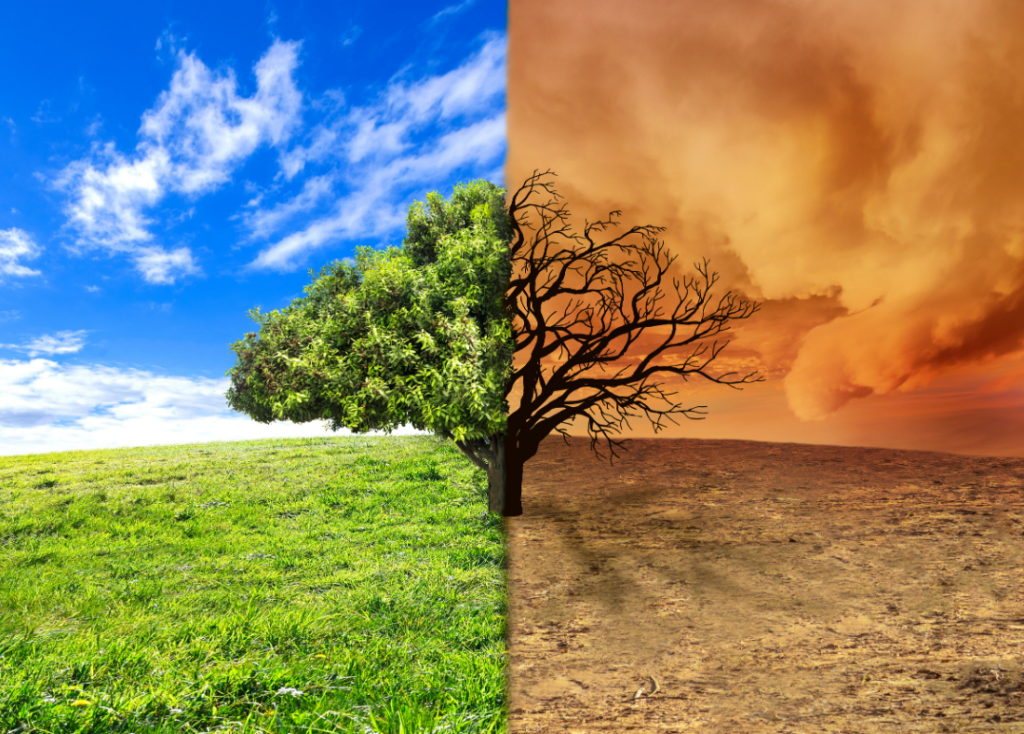By Marilyn Bruno, SanDiego350 Climate Writer

The planet is baking, with the highest sustained average global air temperatures in recorded history: the hottest day ever measured by average global temperature, the hottest week, the hottest June, the highest ocean temperatures, the lowest sea-ice levels, the hottest night all night (103.3 degrees Fahrenheit in Algeria), and hottest day in Death Valley, Iraqa and Kuwait (over 120 degrees F). These numbers indicates that the Earth is indeed in the Anthropocene era, where humans have very rapidly changed the planet’s climate that took billions of years to evolve. Nobody knows if this is reversible or stoppable.
The country teams attending the November 2023 U.N. Climate Change Conference of the Parties (COP 28) have taken note and agreed to create for the first time a “global stocktake” to review how well the world has/has not met the climate change. They will also start to chart out a detailed plan for future action — sector by sector. The stocktake will also focus on where gaps remain for lower-income countries to be able to adapt, mitigate, and measure loss and damage to their territories, infrastructure, energy and food supplies caused by rising temperatures and sea levels.
According to the UN’s Intergovernmental Panel on Climate Change Research, the previous 27 COPs have failed to limit global warming to ensure that temperatures don’t rise more than 1.5 degrees Celsius (2.7 Fahrenheit) above pre-industrial levels. As the delegates to the 2015 Paris Climate Accord determined, that increase is considered the tipping point, after which no known measures can reverse uncontrollable warming. The word “despair” is widely used among the delegates, as Earth’s temperature has already increased ~ 1.2 degrees Celsius (2.2 Fahrenheit) in less time than predicted and with no sign of cooling.
Recent weather reports put over 100 million Americans and most of the rest of the world populations under a heat advisory. The “stocktake” will report human deaths from around the world caused by the record-breaking temperatures and associated cascade of natural disasters: droughts, floods, wildfires, ground deformation impacting the stability of buildings, as well as mass deaths of animals, birds, fish, corals and other marine life caused from disruptions in traditional air and sea flows. Temperatures hit over 100 degrees F near the Arctic Circle, increasing methane emissions, and in the Antarctic where 90% of the planet’s ice is stored, melting is accelerating at an unprecedented rate, changing ocean salinity, temperatures, currents and sea levels.
On our current warming path, global average temperatures are projected increase by more than 3 degrees Celsius (5.4 Fahrenheit) over pre-industrial levels, unleashing mega-catastrophes compared with this year’s disasters, which for the most part are still survivable. Scientists believe that even totally phasing out fossil fuels, sharply increasing renewable energy, planting trees and electrification and increasing energy efficiency of industrial and residential buildings by 2030 will be too little too late, even assuming that the grid does not collapse. We will all be impacted. Property and health insurance companies cannot bear the burden of stronger and more frequent disasters.
Clearly, action beyond surveillance and monitoring is urgently needed now. The host of COP-28 in Dubai, Sultan al-Jaber, who also heads the United Arab Emirates’ state oil companies, says he is the man to make change happen. Calling for “brutal” honesty regarding the oil and gas industry’s role in causing this catastrophe, he is urging the fossil fuel companies to immediately reduce direct and indirect emissions from their operations — known as “Scope 1 and 2.” Most companies have finally agreed, but they are refusing to take responsibility for the “Scope 3” emissions also called for, which requires controlling how consumers use their oil and gas. The industry says they are simply supplying product to satisfy the consumer’s demand, which continues rise due to lifestyle and population growth.
This loophole places the responsibility on the consumer for causing the problem and providing the solution, taking both the government and industry off the hook.
This loophole is just plain brutally dishonest. Governments are certainly responsible for providing a century of subsidies to the oil and gas industry, whose profits top $1 trillion annually, building roads rather than public transportation, destroying habitats to build cities along transportation routes, not to mention subsidizing the $600 billion petro-chemical sector, traditional agriculture and unregulated dumping of fertilizers, plastics and other toxic chemicals in our ecosystems. Industry is certainly responsible for generating profits for themselves (projected to increase by 25% through 2030) without any meaningful incentive to support or transition to greener technologies, while the government has provided little or no regulation to obligate them to do so.
The European Union’s top climate official, Frans Timmermans, warned that more public and private funds are still being spent on fossil fuels than on preventing and adapting to climate change. “We are subsidizing an attack on all of humanity,” he said. “We’re investing in a worse future, not a better one. We’re paying to put our children and grandchildren in harm’s way.”
COP-28 gives governments the opportunity to show they have a credible plan and commitment to tackle the crisis. Stay tuned.
References:
https://www.statista.com/statistics/1325507/oil-and-gas-industry-profits-worldwide/
https://apnews.com/article/climate-change-uae-cop28-d249ace7e593f9acbde6fbf12acaa4ae
https://apnews.com/article/europe-heat-wave-weather-cerberus-greece-spain-italy-ae5053ead1af0328ce3b5ad387cf9626
https://apnews.com/article/humans-epcoch-anthropocene-climate-change-power-4699002bbc3b60ade715ee94a7b7567d
https://www.newyorker.com/news/daily-comment/is-it-hot-enough-yet-for-politicians-to-take-real-action
